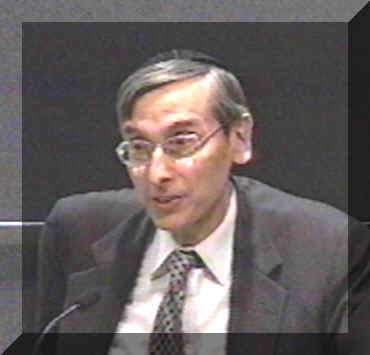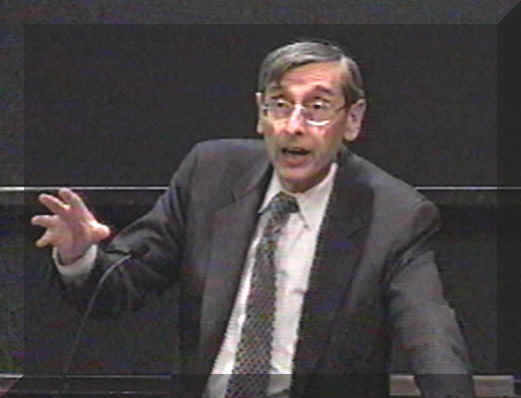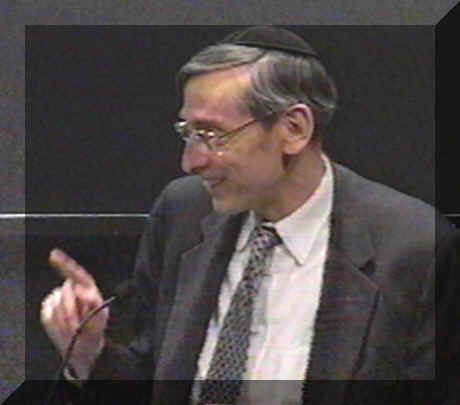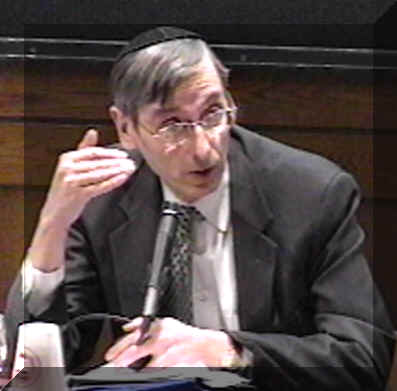 Revisiting
“Confrontation” After Forty Years:
A Response to Rabbi Eugene Korn
Revisiting
“Confrontation” After Forty Years:
A Response to Rabbi Eugene Korn Revisiting
“Confrontation” After Forty Years:
A Response to Rabbi Eugene Korn
Revisiting
“Confrontation” After Forty Years:
A Response to Rabbi Eugene Korn
David Berger
“Confrontation” is a characteristically brilliant, highly influential, and notoriously problematic work. While Rabbi Soloveitchik addresses a number of pragmatic issues clearly and to my mind presciently, he also makes an apparently unqualified assertion that matters of religious faith cannot in principle be communicated. Thus, interfaith dialogue should not and really cannot deal with theological issues. Its only proper subject is the realm of the secular order, expressed in the pursuit of social justice and related concerns.
As Dr. Korn notes, serious readers have raised two fundamental and apparently insuperable objections to these formulations. First, the assertion of the intrinsic incommunicability of matters of faith leads to, or is already, a reductio ad absurdum. Great religious works have been written through the ages by members of disparate faiths, and Rabbi Soloveitchik himself read many of them. Indeed, he was influenced by many of them—and not just on the level that he describes as cultural, a level where even secular thinkers can “enjoy and cherish” religious insights. To make matters worse, he says that the individual “encounter between God and man” cannot even be communicated to another individual in the same faith community. Thus, theological discussion among Jews would also be impossible. Second, the much-quoted footnote that Dr. Korn describes as “the assumed Achilles heel” of “Confrontation” affirming that to the man of faith the so-called secular order is also sacred underscores the artificiality of any sharp division between theological and non-theological matters.
Great thinkers do not write transparent nonsense. They do sometimes engage in rhetorical hyperbole, and the more obvious it is that the literal understanding of a hyperbolic assertion cannot be intended, the more an author has the right to rely on the reader to understand this. But one must also be careful not to denude the rhetoric of all meaning, to the point where it says something so removed from its presumed intent that the formulation misses the point entirely.
Dr. Korn, then, is surely correct in his contention that the plain meaning of Rabbi Soloveitchik’s assertion of total incommunicability must somehow be limited. He suggests, then, that the objection to theological dialogue was restricted to full-fledged religious polemic. Thus, Rabbi Soloveitchik assumed that the modern dialogue would differ very little from the medieval model in which Christians attempted to prove that Jesus was the messiah and that Jewish law has no ongoing validity. This would be a “theological duel to the death.” (p. 10) Rabbi Soloveitchik’s assertion that dialogue is absurd refers only to efforts to prove or disprove faith rationally. (p. 9) He objected, then, or objected primarily, to “doctrinal disputation.” (p. 9) (We are not told what the secondary objections may have been.) This is a neat and clean resolution of the problem, but, as we shall see, I think it does too much violence to Rabbi Soloveichik’s language as well as to other evidence.
Dr. Korn goes on to argue that the major changes in Catholic teachings about Jews and Judaism since “Confrontation” largely neutralize Rabbi Soloveitchik’s concerns. Nostra Aetate itself confirmed the irrevocability of the election of the Jews, Pope John Paul II made clear that the Old Covenant is not revoked, the establishment of diplomatic relations with Israel effectively recognizes the right of the Jewish people to its historic homeland, anti-Semitism has been repudiated and denounced, mission to the Jews has been eliminated, influential Catholics consider Judaism salvific for Jews, and even Cardinal Ratzinger, who looks forward to the acceptance of Christianity by Jews, does not anticipate this before the end of days. Thus, there is no triumphalism, no effort to convert, no disputation, no serious problem.
 Let me begin by conceding that Rabbi Soloveitchik was not
entirely unconcerned by the residual problem of outright polemic.
Dr. Korn correctly notes that he uses the term debate at one point, and I
agree that the term is revealing. It
is also clear that Rabbi Soloveitchik assumed that he was dealing, even on the
eve of Nostra Aetate, with a thoroughly supersessionist Catholicism whose
adherents were interested in converting Jews.
But I cannot agree that the full intent of “Confrontation” is
exhausted by depicting it as a warning against engaging in old-fashioned
disputation. First of all, Jews did
not need such a warning. Second, it
was perfectly clear even in 1963 and 1964 that the call for dialogue was not
framed in disputational terms. Indeed,
that is precisely why Rabbi Soloveitchik had to caution against it.
Thus, the preliminary text “On the Attitude of Catholics toward
Non-Christians and especially toward Jews” distributed at the second session
of the Council on November 8, 1963 declared that “since the Church has so much
of a common patrimony with the synagogue, this Holy Synod intends in every way
to promote and further mutual knowledge and esteem obtained by theological
studies and fraternal discussions” (Arthur Gilbert, The Vatican Council and
the Jews, p. 262). Third, Rabbi
Soloveitchik provided guidance to the interfaith representatives of the
Rabbinical Council of America for many years after Nostra Aetate.
By then it was perfectly evident that interfaith dialogue was not
Barcelona-style disputation, that the parties were not engaging in medieval
polemics about Isaiah 53 or the rationality of the incarnation.
And yet Rabbi Soloveitchik, on the whole, held to his guidelines.
The entire thrust of “Confrontation”’s inspirational rhetoric about
the private character of the religious experience is incommensurate with an
interpretation that sees it as a straightforward injunction against trying to
“prove” your faith; the issue is explicitly communicating an experience, not
demonstrating the truth of a position. In
other words, though the existential character of R. Soloveitchik’s stance
correctly noted by Dr. Korn is indeed inimical to the notion that religious
positions can be definitively proven, the larger argument is that the personal
experience of faith cannot even be communicated. What
can be communicated is intellectual apprehension of faith.
The problem is that such communication is pitifully inadequate.
Let me begin by conceding that Rabbi Soloveitchik was not
entirely unconcerned by the residual problem of outright polemic.
Dr. Korn correctly notes that he uses the term debate at one point, and I
agree that the term is revealing. It
is also clear that Rabbi Soloveitchik assumed that he was dealing, even on the
eve of Nostra Aetate, with a thoroughly supersessionist Catholicism whose
adherents were interested in converting Jews.
But I cannot agree that the full intent of “Confrontation” is
exhausted by depicting it as a warning against engaging in old-fashioned
disputation. First of all, Jews did
not need such a warning. Second, it
was perfectly clear even in 1963 and 1964 that the call for dialogue was not
framed in disputational terms. Indeed,
that is precisely why Rabbi Soloveitchik had to caution against it.
Thus, the preliminary text “On the Attitude of Catholics toward
Non-Christians and especially toward Jews” distributed at the second session
of the Council on November 8, 1963 declared that “since the Church has so much
of a common patrimony with the synagogue, this Holy Synod intends in every way
to promote and further mutual knowledge and esteem obtained by theological
studies and fraternal discussions” (Arthur Gilbert, The Vatican Council and
the Jews, p. 262). Third, Rabbi
Soloveitchik provided guidance to the interfaith representatives of the
Rabbinical Council of America for many years after Nostra Aetate.
By then it was perfectly evident that interfaith dialogue was not
Barcelona-style disputation, that the parties were not engaging in medieval
polemics about Isaiah 53 or the rationality of the incarnation.
And yet Rabbi Soloveitchik, on the whole, held to his guidelines.
The entire thrust of “Confrontation”’s inspirational rhetoric about
the private character of the religious experience is incommensurate with an
interpretation that sees it as a straightforward injunction against trying to
“prove” your faith; the issue is explicitly communicating an experience, not
demonstrating the truth of a position. In
other words, though the existential character of R. Soloveitchik’s stance
correctly noted by Dr. Korn is indeed inimical to the notion that religious
positions can be definitively proven, the larger argument is that the personal
experience of faith cannot even be communicated. What
can be communicated is intellectual apprehension of faith.
The problem is that such communication is pitifully inadequate.
This, I think, is the real thrust of R. Soloveitchik’s position. Of course many elements of religious doctrine, of the content of religious belief, can be conveyed. The assertion that the great encounter between God and man cannot be communicated, applied in the same breath even to individuals of the same faith, cannot mean that no theological discourse is possible. It means that the deepest levels of the faith experience are inaccessible to outsiders, and Rabbi Soloveitchik applies this to a collective of believers as well as to individuals. Thus, as much as theological propositions can be conveyed, as much as even religious emotions can be partially expressed, that which ultimately commits a person to God or a faith community to its particular relationship with God remains essentially private, leaving not only a lonely man of faith but a lonely people of faith—a nation that dwells alone.
Since Rabbi Soloveitchik believed that untrammeled interfaith dialogue presumes to enter into that realm, he declares it out of bounds. Even though dialogue among believers concentrating on social issues has a religious dimension, it does not presume to enter that innermost realm, and its value therefore outweighs its residual dangers. If I am correct, then even theological discussion that knows its place would not be subject to the most radical critique in “Confrontation,” and in this general sense I am in agreement with Dr. Korn. But it is critically important to recognize that the incommunicability of the ultimate religious commitment is not the totality of Rabbi Soloveitchik’s argument. The very fact that he goes beyond that point lends credence to the view that he did not mean it as an all-encompassing delegitimation of any theological discussion. If he did, there would have been little reason to go further. But he does go further, and here his argument moves from the extreme rhetoric of philosophical absolutism to the penetrating, pragmatic, prescient insights that make “Confrontation” an essay of ongoing relevance.
Rabbi Soloveitchik worried that theological dialogue would create pressure to “trade favors pertaining to fundamental matters of faith, to reconcile ‘some’ differences.” He argued against any Jewish interference in the faith of Christians both on grounds of principle and out of concern that this would create the framework for reciprocal expectations. Now, the changes in Catholic attitudes detailed by Dr. Korn are real, welcome, and significant, but they do not undermine these concerns. Quite the contrary. The trajectory of dialogue to our own day has confirmed the validity of Rabbi Soloveitchik’s analysis to an almost stunning degree.
 It is precisely friendly theological discussion and not
religious disputation that generates these dangers, all the more so when the
discussion is formalized as a theological encounter not between individuals but
between communities. As I noted in a
paper on Dabru Emet posted on the Center’s website, a prominent
participant in the dialogue with as positive an attitude toward Jews and Judaism
as one could hope for congratulated the Jewish theologians who authored that
declaration. “The
dialogue,” he said, “will be stymied if Christians affirm a theological
bonding with Jews…without an acknowledgement of such bonding from the Jewish
side.” Several years ago, I
criticized The New York Board of Rabbis for inviting its members to participate
in an interfaith prayer service in the main sanctuary of St. Patrick’s
cathedral, asserting in an interview with The Jewish Week that although
many Jewish authorities maintained that classical Christian theology is not
considered idolatry for Christians, it is for Jews.
In light of this, prayer in such a setting raises the most serious of
issues to the point where no Orthodox rabbi should even consider participating.
An important official in the New York Archdiocese wrote a strong letter
of protest to the paper, and in a private letter to me, he complained about my
expressing such an assessment of Christianity after all that Catholics had done
to reassess their negative image of Judaism.
In an article on Dominus Iesus, I have already expressed my regret
at using the term idolatry, which is easily misunderstood in this context, but
my correspondent was not mollified even after he understood very well that I was
not suggesting that Christians attribute divinity to icons.
Rabbi Soloveitchik’s concern about the trading of favors pertaining to
fundamental matters of faith could not be more clearly illustrated.
It is precisely friendly theological discussion and not
religious disputation that generates these dangers, all the more so when the
discussion is formalized as a theological encounter not between individuals but
between communities. As I noted in a
paper on Dabru Emet posted on the Center’s website, a prominent
participant in the dialogue with as positive an attitude toward Jews and Judaism
as one could hope for congratulated the Jewish theologians who authored that
declaration. “The
dialogue,” he said, “will be stymied if Christians affirm a theological
bonding with Jews…without an acknowledgement of such bonding from the Jewish
side.” Several years ago, I
criticized The New York Board of Rabbis for inviting its members to participate
in an interfaith prayer service in the main sanctuary of St. Patrick’s
cathedral, asserting in an interview with The Jewish Week that although
many Jewish authorities maintained that classical Christian theology is not
considered idolatry for Christians, it is for Jews.
In light of this, prayer in such a setting raises the most serious of
issues to the point where no Orthodox rabbi should even consider participating.
An important official in the New York Archdiocese wrote a strong letter
of protest to the paper, and in a private letter to me, he complained about my
expressing such an assessment of Christianity after all that Catholics had done
to reassess their negative image of Judaism.
In an article on Dominus Iesus, I have already expressed my regret
at using the term idolatry, which is easily misunderstood in this context, but
my correspondent was not mollified even after he understood very well that I was
not suggesting that Christians attribute divinity to icons.
Rabbi Soloveitchik’s concern about the trading of favors pertaining to
fundamental matters of faith could not be more clearly illustrated.
In that reaction to Dabru Emet, I also cited an example of the sort of Jewish demand upon Christians that Rabbi Soloveitchik opposed and that can so easily lead to reciprocal demands. A prominent Jewish ecumenist denounced a Catholic document for implying that at the end of days, Jews would discover that the Messiah is after all Jesus of Nazareth. Such a denunciation is, in my view, a virtual reductio ad absurdum of the sort of interference in the faith of the other that Rabbi Soloveitchk warned about. As Dr. Korn notes, and as I emphasized in my reaction to Dominus Iesus, Cardinal Ratzinger’s expectation that Jews will recognize the truth of Christianity at the end of days is entirely unobjectionable, and it indeed parallels Rabbi Soloveitchik’s assertion of the eschatological confirmation of Judaism. While this assertion does not necessarily mean that non-Jews will, in Dr. Korn’s formulation, “adopt the current practices” of Judaism, it does mean that they will recognize its truth and adopt its creed.
Cardinal Ratzinger’s vision, however, is not confined to the eschaton. He appears interested in bringing individual Jews to a recognition of Christian truth even before the end of days, and he sees interfaith dialogue—though that is not its only purpose--as one means of accomplishing this end. (It is worth noting that even in the Middle Ages, the survival of a Jewish collective until the Second Coming was seen as part of the divine plan.) I argued for this understanding of the Cardinal’s position in that article on Dominus Iesus and cannot revisit it now, but at least as I see it, even Rabbi Soloveitchik’s concern about a missionary aspect of dialogue has not been rendered altogether obsolete by the developments underscored by Dr. Korn.
The assertion that the caveats expressed in
“Confrontation” bear continuing relevance does not mean that they carry the
authority of Sinaitic revelation or that they are easy to apply.
I have already emphasized my understanding that Rabbi Soloveitchik was
not asserting the categorical impossibility of all theological communication.
Persuasive anecdotal evidence indicates that he worried about the lack of
qualifications for such dialogue among most Orthodox rabbis, a concern that
comes to the fore in Dr. Korn’s eloquent peroration.
One of the rabbis most committed to enforcing Rabbi Soloveitchik’s
guidelines has told me on more than one occasion that his revered mentor had
said that he trusted Rabbi Walter Wurzburger to deal with theological issues in
conversation with Christians. Discussions
of anti-Semitism, which Orthodox representatives consider kosher and even
essential, lead to the most sensitive issues involving sacred Christian texts.
For pragmatic reasons, Orthodox Jews want Christians to understand the
theological importance that Judaism assigns to the
Afterword
 To
Dr. Korn:
To
Dr. Korn:
Dr. Korn and I begin from different points of departure; in contemporary language, our default positions are different. He affirms the essential desirability of theological dialogue while recognizing certain concerns that may limit it. I regard the inherent dynamic of such dialogue as dangerous to the integrity of the respective faiths while recognizing that certain circumstances require risk-taking in the interest of an urgent good. How close our positions will become in particular instances depends on how seriously he takes his caveats and how flexibly I apply my special circumstances. Sometimes our positions may converge, but often they will not.
To Rabbi Klapper:
Rabbi Klapper writes that I
do not explain why the impossibility of ultimate success should impel Rabbi
Soloveitchik to declare the attempt to engage in theological dialogue not
worthwhile. “After all, much of
the Rav’s philosophy is built on a tragic vision of humanity ever-engaged in a
Sisyphean effort to draw near to G-d the Wholly Other, knowing all the time that
the closer we draw the more powerfully we are repelled.”
The difference, I think, is that the ultimate failure of the
individual’s effort to reach God does not carry with it the dangers of
establishing an intercommunal effort that is sure to fail.
God understands from the outset that the individual will fall short, but
He will reward him or her for the effort. But
the community of the other, after years of repeated efforts doomed to futility,
may not be so understanding. In
short, communal projects that cannot succeed run a grave risk of poisoning
relations rather than improving them.
Moreover, in Rabbi Soloveitchik’s eyes, the desire to reach God is
inherently admirable, while the desire for an analogous “drawing near” on
the theological plane is essentially objectionable.